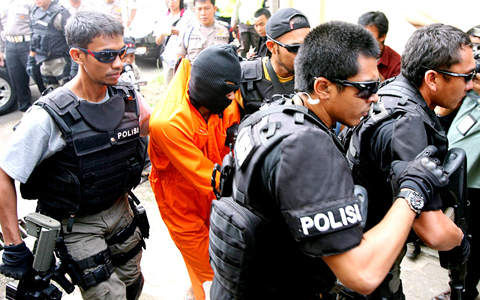Fingerprint analysis has confirmed that a man killed by Indonesian police at the weekend was not fugitive terror suspect Noordin Mohammed Top, a counter-terror police officer said yesterday.
Officials were publicly sticking to their line that only DNA tests would confirm the identity of the body but a source involved in the investigation said Noordin remained at large.
“It’s not him. We know from his facial structure as well as his fingerprints,” the police source said, requesting anonymity.

PHOTO: EPA
“We’re continuing to track his whereabouts,” the source said.
Noordin was reported by the local media to have been shot dead by police at the end of a 17-hour siege of a remote farmhouse in Central Java on Saturday.
Senior counter-terrorism official Ansyad Mbai refused to comment on the identity of the body retrieved from the farmhouse, saying DNA tests would confirm whether it was Noordin or not.
“It’s better that we wait for the forensic identification,” he said.
Noordin, 40, is a Malaysian Islamist who is wanted for multiple suicide bombings against Western targets in Indonesia since 2003 which have killed about 50 people and injured hundreds.
He is one of the most wanted alleged terror masterminds in Asia, and has a US$100,000 bounty on his head from the Indonesian government.
The police source indicated that Noordin may have escaped from the farmhouse before police laid siege to it about 4pm on Friday.
“We were not as quick as him,” he said.
Police have come close to arresting the Malaysian, who leads a breakaway faction of the Jemaah Islamiyah regional terror network, several times and have captured or killed some of his closest associates.
They have intensified the hunt since the July 17 twin suicide bombings on the JW Marriott and Ritz-Carlton hotels in the capital, which killed seven people including six foreigners plus the two bombers.
Five of Noordin’s alleged accomplices have been arrested in recent days and two men described by police as would-be suicide bombers were killed in a raid that uncovered a major bomb factory in Bekasi, outside Jakarta.
Police said the would-be bombers had rigged a small truck as a bomb and were planning to launch a suicide attack against Indonesian President Susilo Bambang Yudhoyono’s main residence, which is a 12-minute drive away.
The attack, timed around Indonesia’s Independence Day on Aug. 17, had been ordered by Noordin during a meeting on April 30 as revenge for the execution of three men convicted over the 2002 Bali bombings that killed 202 people.

One of Japan’s biggest pop stars and best-known TV hosts, Masahiro Nakai, yesterday announced his retirement over sexual misconduct allegations, reports said, in the latest scandal to rock Japan’s entertainment industry. Nakai’s announcement came after now-defunct boy band empire Johnny & Associates admitted in 2023 that its late founder, Johnny Kitagawa, for decades sexually assaulted teenage boys and young men. Nakai was a member of the now-disbanded SMAP — part of Johnny & Associates’s lucrative stable — that swept the charts in Japan and across Asia during the band’s nearly 30 years of fame. Reports emerged last month that Nakai, 52, who since

EYEING A SOLUTION: In unusually critical remarks about Russian President Vladimir Putin, US President Donald Trump said he was ‘destroying Russia by not making a deal’ US President Donald Trump on Wednesday stepped up the pressure on Russian President Vladimir Putin to make a peace deal with Ukraine, threatening tougher economic measures if Moscow does not agree to end the war. Trump’s warning in a social media post came as the Republican seeks a quick solution to a grinding conflict that he had promised to end before even starting his second term. “If we don’t make a ‘deal,’ and soon, I have no other choice but to put high levels of Taxes, Tariffs, and Sanctions on anything being sold by Russia to the United States, and various other

‘BALD-FACED LIE’: The woman is accused of administering non-prescribed drugs to the one-year-old and filmed the toddler’s distress to solicit donations online A social media influencer accused of filming the torture of her baby to gain money allegedly manufactured symptoms causing the toddler to have brain surgery, a magistrate has heard. The 34-year-old Queensland woman is charged with torturing an infant and posting videos of the little girl online to build a social media following and solicit donations. A decision on her bail application in a Brisbane court was yesterday postponed after the magistrate opted to take more time before making a decision in an effort “not to be overwhelmed” by the nature of allegations “so offensive to right-thinking people.” The Sunshine Coast woman —

PINEAPPLE DEBATE: While the owners of the pizzeria dislike pineapple on pizza, a survey last year showed that over 50% of Britons either love or like the topping A trendy pizzeria in the English city of Norwich has declared war on pineapples, charging an eye-watering £100 (US$124) for a Hawaiian in a bid to put customers off the disputed topping. Lupa Pizza recently added pizza topped with ham and pineapple to its account on a food delivery app, writing in the description: “Yeah, for £100 you can have it. Order the champagne too! Go on, you monster!” “[We] vehemently dislike pineapple on pizza,” Lupa co-owner Francis Wolf said. “We feel like it doesn’t suit pizza at all,” he said. The other co-owner, head chef Quin Jianoran, said they kept tinned pineapple